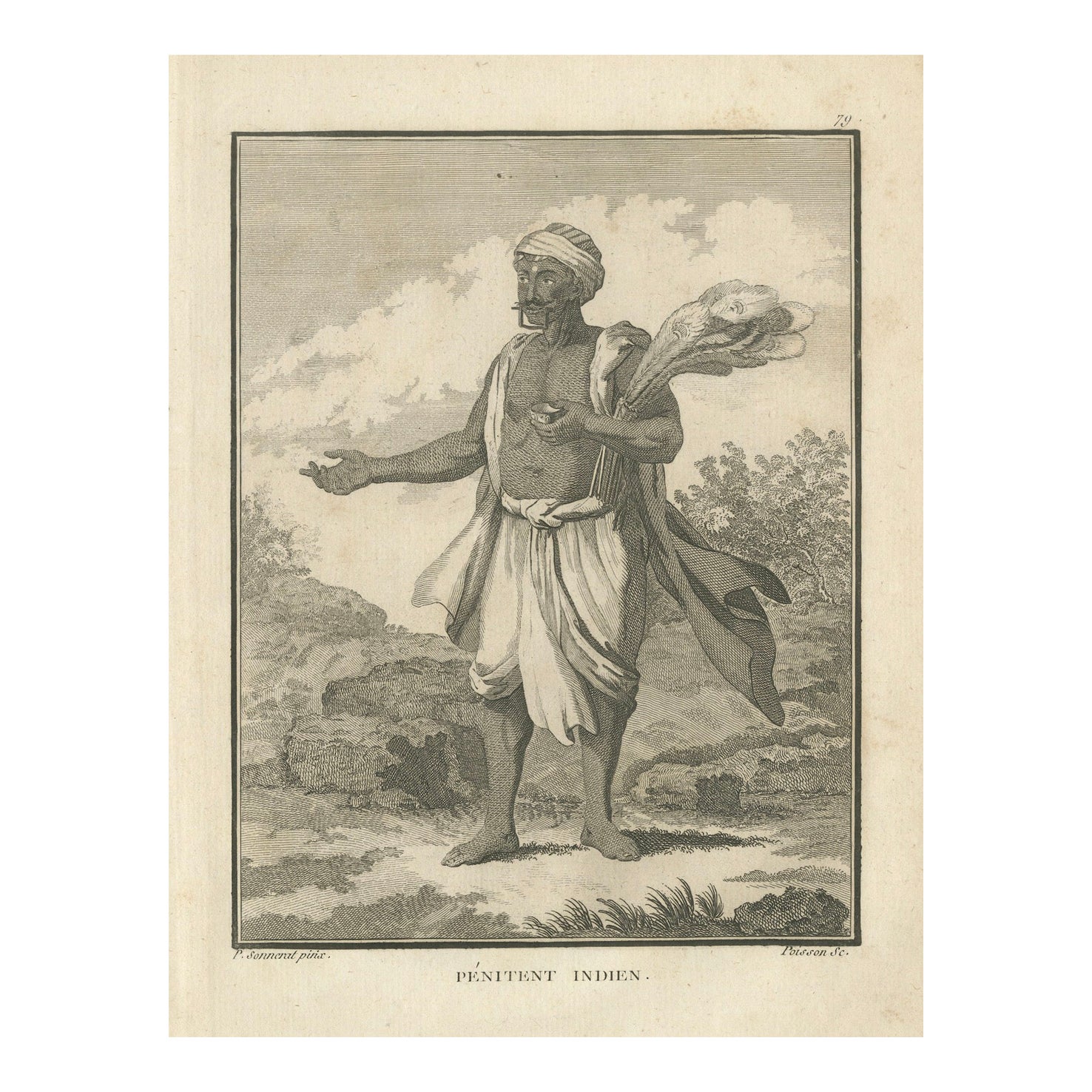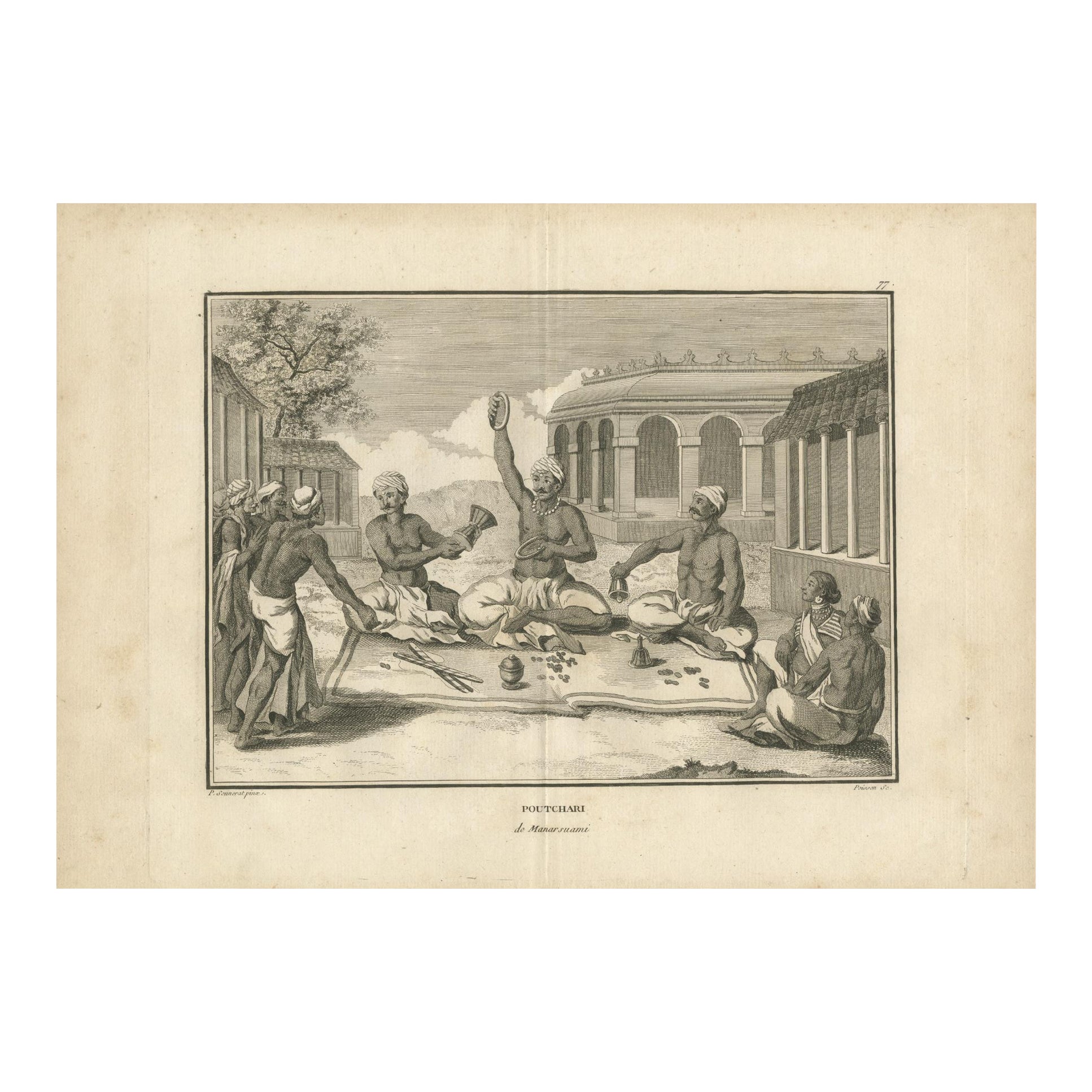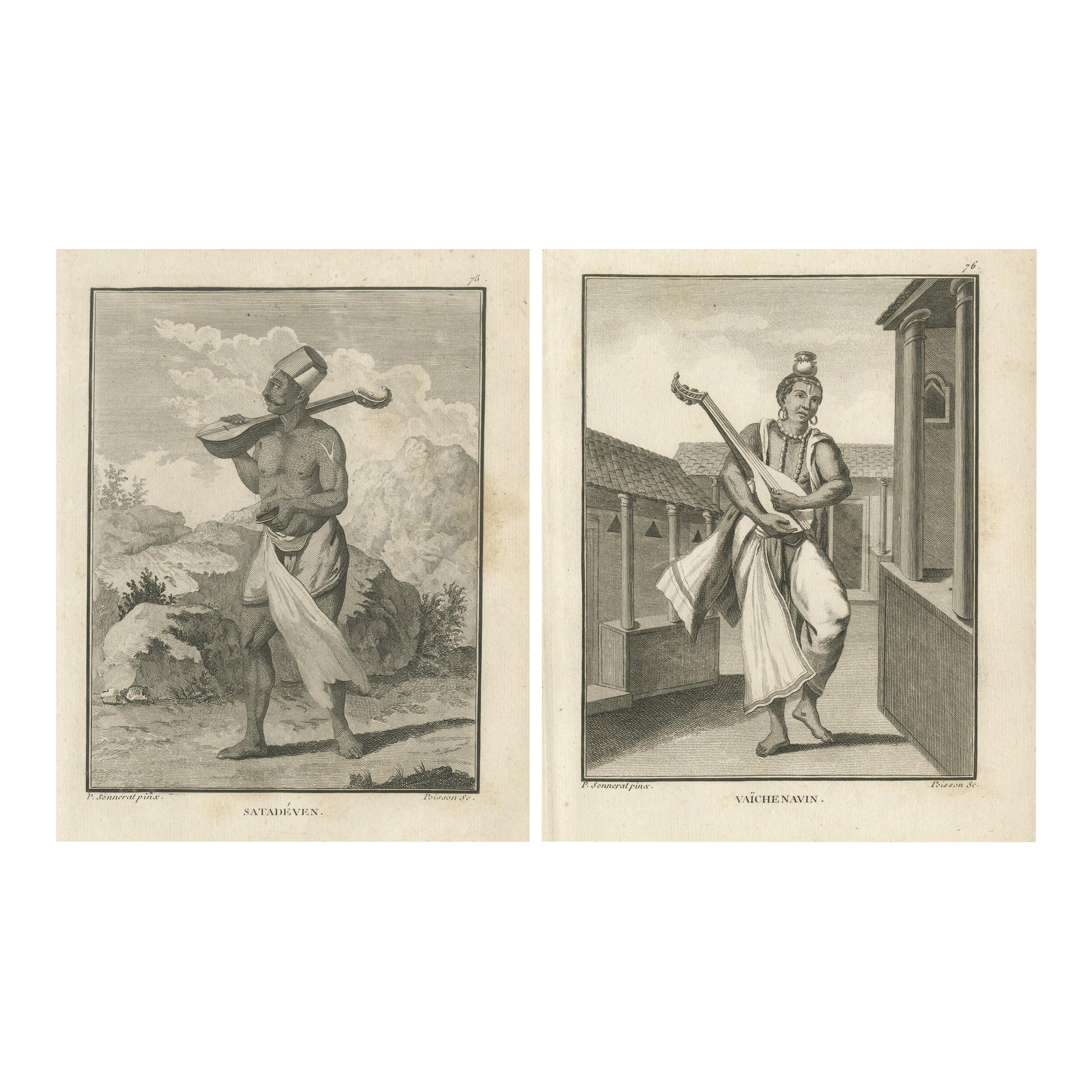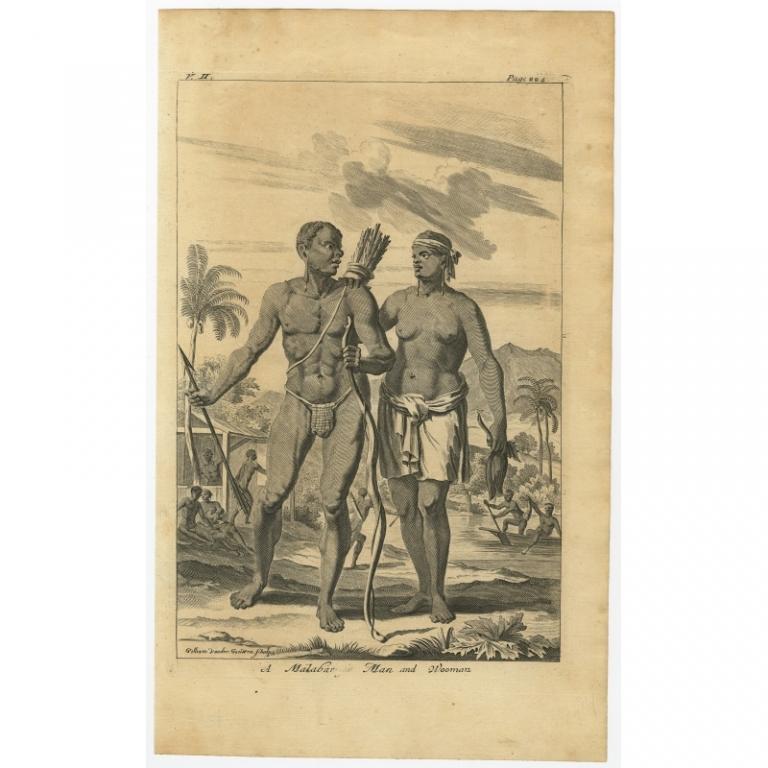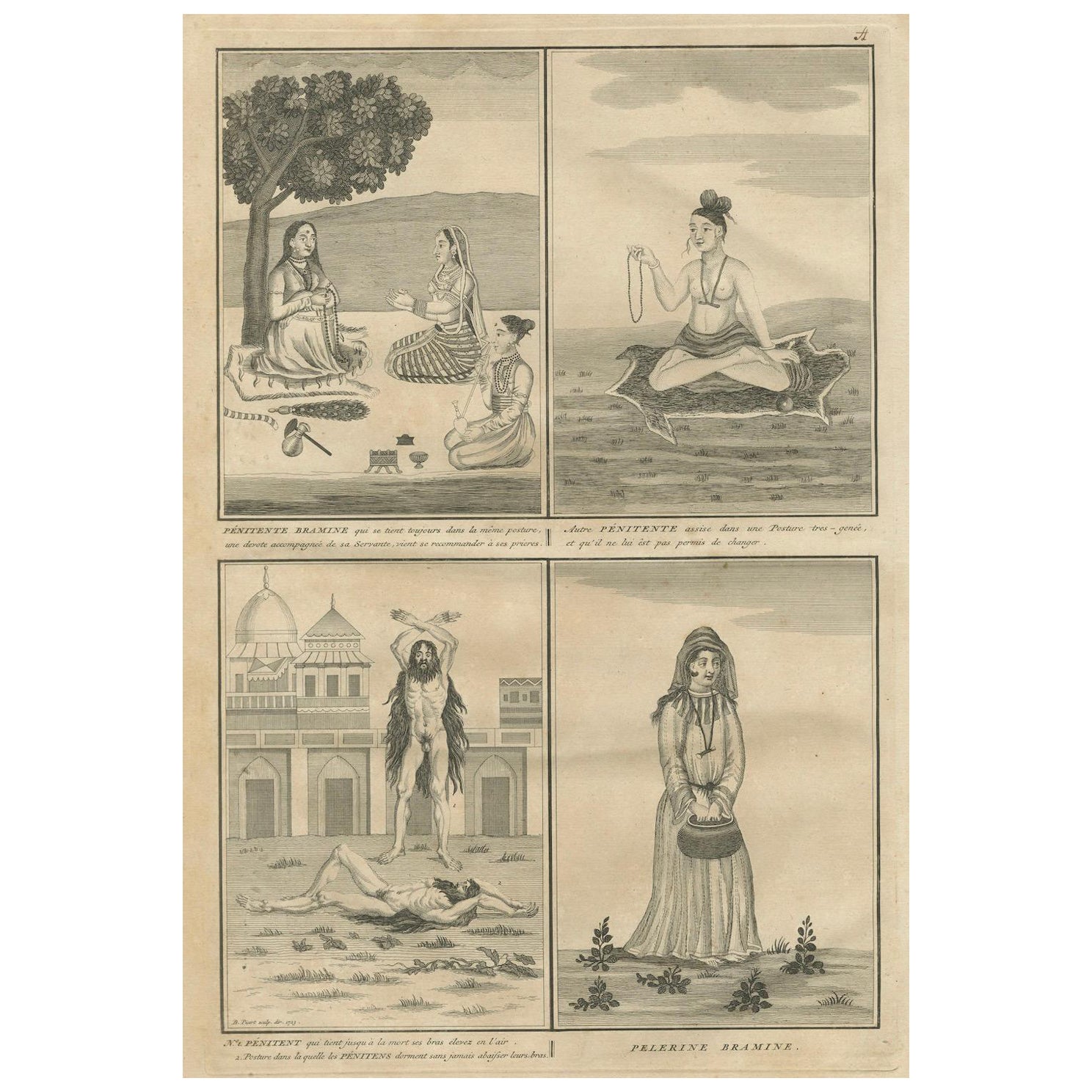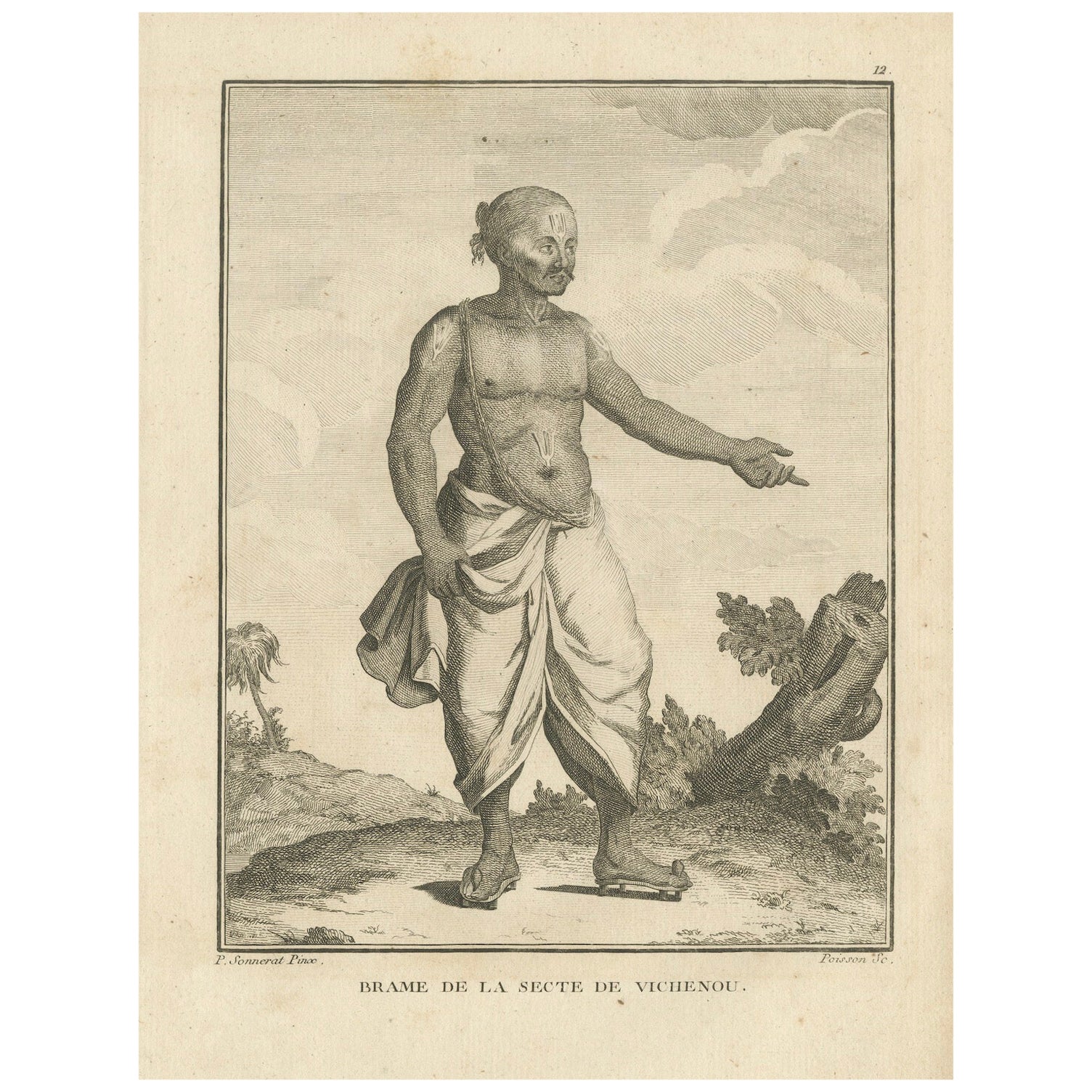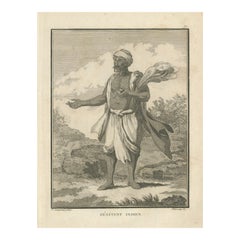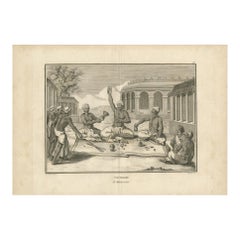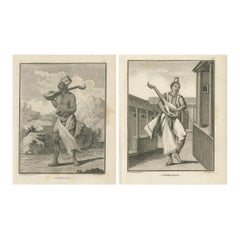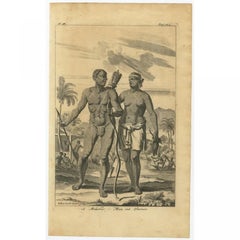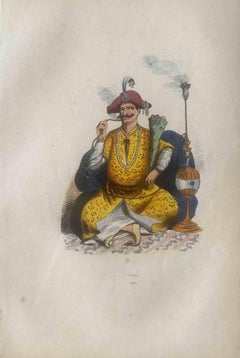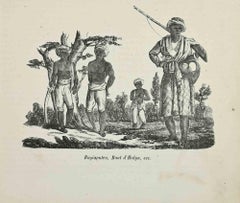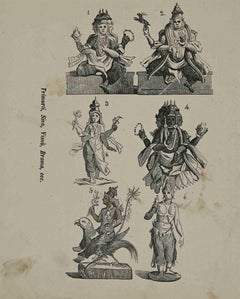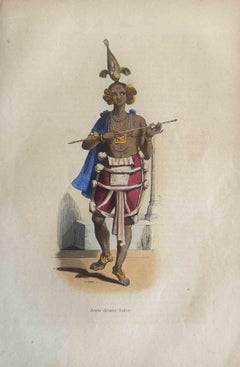Items Similar to Hindu Couple with Ritual Implements – Poutchari of Darma Raja, 1806
Want more images or videos?
Request additional images or videos from the seller
1 of 10
Hindu Couple with Ritual Implements – Poutchari of Darma Raja, 1806
$200.78
£151.16
€170
CA$276.59
A$309.76
CHF 161.63
MX$3,783.59
NOK 2,056.37
SEK 1,938.38
DKK 1,294.06
About the Item
Hindu Couple with Ritual Implements – Poutchari of Darma Raja, 1806
This antique engraving titled Poutchari de Darma-Raja presents an intimate scene of a Hindu couple seated on the ground beneath a palm tree, engaged in what appears to be a moment of religious or ceremonial discussion. The male figure sits cross-legged, adorned with a turban and a pendant around his neck, while the woman beside him gestures expressively as if explaining or reciting something. Both are clothed in regional South Indian garments, the woman notably wearing striped drapery and jewelry.
In front of them lies a mat scattered with ritual objects—bells, a cup, and beads or seeds—suggesting their involvement in a devotional or priestly function. The title *Poutchari* again refers to a religious or temple assistant, while *Darma Raja* (or Dharma Raja) likely denotes the deity or ruling authority to whom their service is dedicated. The scene is set against a backdrop of classical temple architecture and a hilly landscape, situating the interaction within a sacred or institutional space.
This image is taken from the 1806 edition of Voyage aux Indes Orientales et à la Chine by Pierre Sonnerat (1745–1814), a French explorer and naturalist who documented the cultures, religions, and social customs of India and Southeast Asia. The engraving was created by Jean-Baptiste-Marie Poisson (1747–1820), whose technical finesse captures the calm intimacy of the moment with expressive linework and subtle shading.
This piece offers an ethnographic window into temple life and religious dialogue in early 19th-century South India, with a focus on personal interaction rather than grand ceremony. It is a valuable addition for collectors interested in Indian devotional practice, colonial-era observation, or visual anthropology.
Condition report:
Very good condition. Minor toning and occasional foxing in the margins. Central image clean and sharply printed, with excellent contrast.
Framing tips:
Ideal for display in a walnut or dark wood frame with a light natural mat to complement the paper tone and highlight the quiet symmetry of the composition.
Technique: Engraving
Maker: J.-B.-M. Poisson after Pierre Sonnerat, Paris, 1806
- Dimensions:Height: 11.23 in (28.5 cm)Width: 8.27 in (21 cm)Depth: 0.01 in (0.2 mm)
- Materials and Techniques:Paper,Engraved
- Place of Origin:
- Period:
- Date of Manufacture:1806
- Condition:Very good condition. Minor toning and occasional foxing in the margins. Central image clean and sharply printed, with excellent contrast.
- Seller Location:Langweer, NL
- Reference Number:Seller: BG-13429-771stDibs: LU3054346092852
About the Seller
5.0
Recognized Seller
These prestigious sellers are industry leaders and represent the highest echelon for item quality and design.
Platinum Seller
Premium sellers with a 4.7+ rating and 24-hour response times
Established in 2009
1stDibs seller since 2017
2,533 sales on 1stDibs
Typical response time: <1 hour
- ShippingRetrieving quote...Shipping from: Langweer, Netherlands
- Return Policy
Authenticity Guarantee
In the unlikely event there’s an issue with an item’s authenticity, contact us within 1 year for a full refund. DetailsMoney-Back Guarantee
If your item is not as described, is damaged in transit, or does not arrive, contact us within 7 days for a full refund. Details24-Hour Cancellation
You have a 24-hour grace period in which to reconsider your purchase, with no questions asked.Vetted Professional Sellers
Our world-class sellers must adhere to strict standards for service and quality, maintaining the integrity of our listings.Price-Match Guarantee
If you find that a seller listed the same item for a lower price elsewhere, we’ll match it.Trusted Global Delivery
Our best-in-class carrier network provides specialized shipping options worldwide, including custom delivery.More From This Seller
View AllIndian Penitent with Ritual Implements – Engraving after Sonnerat, 1806
Located in Langweer, NL
Indian Penitent with Ritual Implements – Engraving after Sonnerat, 1806
This striking antique engraving titled Pénitent Indien (Indian Penitent) portrays a barefoot ascetic figure s...
Category
Antique Early 1800s French Prints
Materials
Paper
Hindu Priestly Assembly – Poutchari of Maarraami, Engraving, 1806
Located in Langweer, NL
Hindu Priestly Assembly – Poutchari of Maarraami, Engraving, 1806
This detailed engraving titled Poutchari de Maarraami depicts a group of Hindu priests or temple functionaries sea...
Category
Antique Early 1800s French Prints
Materials
Paper
Hindu Sacred Musicians – Satadéven and Vaïche Navin, 1806
Located in Langweer, NL
Hindu Sacred Musicians – Satadéven and Vaïche Navin, 1806
This finely executed engraving features two South Indian sacred musicians, titled Satadéven and Vaïche Navin, each holding ...
Category
Antique Early 1800s French Prints
Materials
Paper
A Malabar Man and Woman, India, Nieuhof, 1744
Located in Langweer, NL
Antique print, titled: 'A Malabar Man and Wooman.' - This plate shows a man and woman from Malabar, India. It originally accompanied J. Nieuhof's account of his 'Voyages and Travels ...
Category
Antique 18th Century Prints
Materials
Paper
$141 Sale Price
20% Off
Indian Brahmin Penitents and Pilgrim – Rare 18th Century Ritual Engraving, 1734
Located in Langweer, NL
Title: Indian Brahmin Penitents and Pilgrim – Rare 18th Century Ritual Engraving
Description:
This compelling copperplate engraving from the 18th century offers a rare visual study of Indian religious asceticism and devotion as interpreted through a European lens. It likely originates from the later volumes of *The Ceremonies and Religious Customs of Various Nations of the Known World*, the monumental multi-volume series published in Amsterdam and Paris during the early to mid-1700s, with illustrations attributed to Bernard Picart and his collaborators.
The sheet is divided into four separately framed scenes, each depicting a unique figure engaged in acts of penance or pilgrimage. The upper left panel shows a seated female "Pénitente Bramine" (Brahmin penitent) under a flowering tree, joined by other women in a meditative or devotional posture. The details, such as the tiger skin mat and ceremonial tools, signal both religious symbolism and ritual practice.
The upper right image presents a solitary ascetic woman seated in rigid meditation on what appears to be a stretched animal hide floating in water, holding a prayer bead mala. The caption explains she must never change position, emphasizing the extremity of her discipline.
The lower left quadrant is the most dramatic: a male penitent with wild hair stands before a temple with both arms raised straight in the air, said to remain that way until death. Another figure lies prostrate in the grass, illustrating the prescribed sleeping posture for certain penitents—lying flat without ever bending their legs. These powerful visual representations underscore the physical trials undertaken by devout individuals in pursuit of spiritual transcendence.
In the lower right, a "Pélerine Bramine" (Brahmin female pilgrim) stands quietly, dressed simply, with a bowl in hand, perhaps engaged in ritual begging or...
Category
Antique 1730s Prints
Materials
Paper
Vaishnavite Brahmin from India – Sonnerat Engraving, Paris Edition, 1806
Located in Langweer, NL
Vaishnavite Brahmin from India – Sonnerat Engraving, Paris Edition, 1806
This finely engraved plate titled *Brame de la Secte de Vichenou* (Brahmin of the Sect of Vishnu) is plate n...
Category
Antique Early 1800s Prints
Materials
Paper
You May Also Like
Uses and Customs - Indian Rajah - Lithograph - 1862
Located in Roma, IT
Uses and Customs - Indian Rajah is a lithograph on paper realized in 1862.
The artwork belongs to the Suite Uses and customs of all the peoples of the universe: " History of the gov...
Category
1860s Modern Figurative Prints
Materials
Lithograph
Customs - Rajput - Lithograph - 1862
Located in Roma, IT
Customs - Rajput is a Hand-colored lithograph on paper realized in 1862.
Titled on the lower.
The artwork belongs to the Suite Uses and customs of all the peoples of the universe :...
Category
1860s Modern Figurative Prints
Materials
Lithograph
Siva, Visnu, Brama - Indian Costumes - Lithograph - 1862
Located in Roma, IT
Siva, Visnu, Brama - Indian Costumes is a Hand-colored lithograph on paper realized in 1862.
The artwork belongs to the Suite Uses and customs of all the peoples of the universe: ...
Category
1860s Modern Figurative Prints
Materials
Lithograph
Uses and Customs - Indian - Lithograph - 1862
Located in Roma, IT
Uses and Customs - Indian is a lithograph on paper realized in 1862.
The artwork belongs to the Suite Uses and customs of all the peoples of the universe: " History of the governmen...
Category
1860s Modern Figurative Prints
Materials
Lithograph
Uses and Customs - Indian - Lithograph - 1862
Located in Roma, IT
Uses and Customs - Indian is a lithograph on paper realized in 1862.
The artwork belongs to the Suite Uses and customs of all the peoples of the universe: " History of the governmen...
Category
1860s Modern Figurative Prints
Materials
Lithograph
Mughal School, 18th Century Emperor Jahangir with Empress Nur Jahan
Located in Middletown, NY
Emperor Jahangir and Empress Nur Jahan exchanging lotus blossoms; a symbol of beauty, purity, honesty, rebirth, self-regeneration, and enlightenment....
Category
18th Century Rajput Figurative Drawings and Watercolors
Materials
Gold
